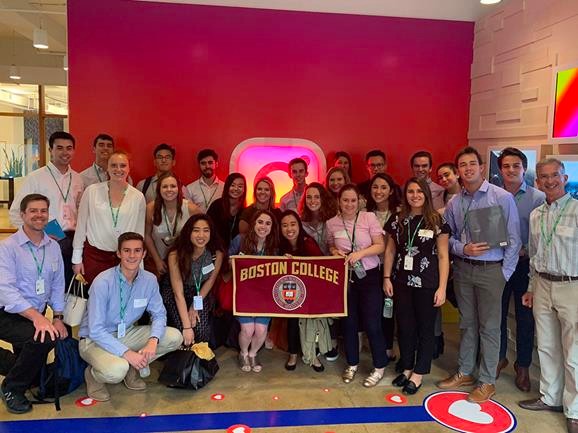TechTrek goes East: Co-professors share the journey so far
TechTrek has come East. In a long list of trends that start on the West Coast, this is a big one for Boston College students. Headed up by Professors Jere Doyle and Jerry Kane, TechTrek East follows a curriculum similar to TechTrek West–classroom study combined with company visits. That still means whirlwind trips to big cities, CEO panels, and super-packed agendas, yet geography makes a difference.
“There’s a certain mystique about digital innovation in California,” says Kane. “Because Manhattan is so close, TechTrek East is a shorter period of time and more consolidated.”
But what TechTrek East may lack in the "mystique” it more than makes up for in alumni connections, insider perspectives, and exposure to a broad range of technology-enabled companies.
“There’s a lot more alumni in New York and Boston,” Kane continues. “It shows folks that while Silicon Valley is great, there’s an alternative.”
TechTrek East student Jenna Steichen '21 echoes that sentiment. “I was initially hesitant to apply for Tech Trek East rather than West, as my preconceptions were that all major tech innovation happened on the West Coast.
“However, I was blown away by my experience, and I gained a deeper appreciation for the broad BC alumni network and technology opportunities in NYC and Boston,” says Steichen. “The visits were energizing and each company we met with had a unique story that added value to the experience.”
4 days, 3 nights, 22 companies
With 24 students (equally split between women and men, sophomores and juniors), TechTrek East is off to a successful start. The class meets once a week for three hours, with a couple of visits in Boston on Friday afternoons. The first field study was in Manhattan over Columbus Day weekend. Doyle says the fact the trip was held during fall break is a testament to the students dedication to the class.
“We left on Sunday and headed straight to the 911 Memorial to begin our visit, followed by a kickoff dinner with alum Mark DeNatale, '94,” said Doyle. “We visited seven or eight companies each day for three days, plus a panel with four CEOs. We were back in Boston on Wednesday.”
The group spent 1 ½ hours at each company–22 in all–starting on Monday morning with social listening leader Sprinklr, and moving on to the likes of Harry’s, Google, Facebook, and Goldman Sachs.
“We go big and small, so students can see the difference at a big, structured company versus a small startup,” says Doyle, a Carroll School alum and proven entrepreneur in his own right. He even arranged to visit Ceros, a company he’s invested in, and introduced the students to CEO Simon Berg.
“It was spectacular,” he said. “For me, it was great, because it was connecting all my worlds.”
Connecting the dots
Since the whole basis of TechTrek is to explore the lifecycle of tech startups and expand students’ networks, visits like these also connect the dots for them.
“Students love it,” says Kane. “They’ve all studied these companies and blog and tweet about them. Alumni follow along on Twitter. “So they’ve had a lot of good dialogue,” he adds, “but there’s nothing like going in and seeing the company and learning about the challenges they have firsthand.”
TechTrek East students not only hear about challenges, they also hear about opportunities. And because the program touches on a diverse range of roles, that’s a draw for students from every major, not just computer science. “There’s something for every major,” Kane adds, “as long as they’re interested in technology.”
It’s about the journey
Naturally, that interest in tech extends to startups–with augmented reality and fin tech at the top of most students’ wish lists these days. But Doyle is quick to point out that TechTrek isn’t designed to push entrepreneurship.
“We’re not trying to get kids to start companies,” he says. “We’re trying to get them to work in a startup and learn what it’s like.
“Entrepreneurs talk about their journeys,” he adds. “It’s about taking risks. Trying something new. Getting a little uncomfortable.”
East or west, Doyle and Kane believe TechTrek should leave students with one takeaway: “Find something you’re passionate about, and don’t be afraid to think outside your comfort zone.”



